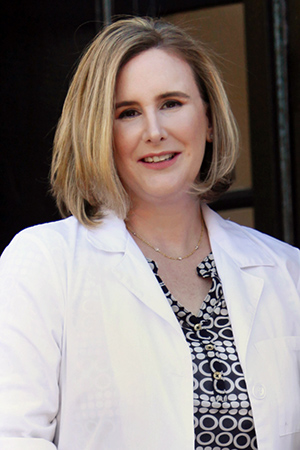About Dr. Elizabeth Vieta, MD
Sarah Vieta, MD, board-certified dermatologist, fellowship-trained Mohs surgeon, and owner of Vieta Dermatology, PLLC, opened her practice in July 2018. She is no stranger to the dermatology community in Moore and surrounding counties. As the first fellowship-trained Mohs surgeon to practice in Pinehurst, she previously practiced with the Pinehurst Skin Center and the Cary Skin Center (Pinehurst location). Her advanced training enables her to provide patients with the most effective and advanced treatment for skin cancer today, offering the highest potential for cure, right in their own neighborhood.
Dr. Sarah Vieta was born and raised in Miami, FL. She received her undergraduate degree with honors from the University of Notre Dame and her Doctor of Medicine with honors from Wake Forest University School of Medicine. She completed her internship in internal medicine at Wake Forest University School of Medicine and received her dermatology residency training at Vanderbilt University School of Medicine and The Icahn School of Medicine at Mount Sinai in New York, NY, where she served as chief resident during her final year. Dr. Vieta continued her training by completing an American College of Mohs Surgery accredited Micrographic Surgery & Dermatologic Oncology (Mohs) fellowship in Miami, FL.
The Vieta family lives in Pinehurst. Most of Dr. Vieta’s time outside of the office is spent with her husband, Dr. Paul Vieta, Jr. and their son. Dr. Vieta enjoys spending time outdoors, cooking and gardening.
Dr. Sarah Vieta was born and raised in Miami, FL. She received her undergraduate degree with honors from the University of Notre Dame and her Doctor of Medicine with honors from Wake Forest University School of Medicine. She completed her internship in internal medicine at Wake Forest University School of Medicine and received her dermatology residency training at Vanderbilt University School of Medicine and The Icahn School of Medicine at Mount Sinai in New York, NY, where she served as chief resident during her final year. Dr. Vieta continued her training by completing an American College of Mohs Surgery accredited Micrographic Surgery & Dermatologic Oncology (Mohs) fellowship in Miami, FL.
The Vieta family lives in Pinehurst. Most of Dr. Vieta’s time outside of the office is spent with her husband, Dr. Paul Vieta, Jr. and their son. Dr. Vieta enjoys spending time outdoors, cooking and gardening.
Patient Education Resources
If I have psoriasis, am I likely to get arthritis?
Psoriasis is a chronic skin condition that causes red, scaly patches on the skin. It affects about 2-3% of the population. People with psoriasis are at an increased risk of developing a form of arthri...
Psoriasis is a chronic skin condition that causes red, scaly patches on the skin. It affects about 2-3% of the population. People with psoriasis are at an increased risk of developing a form of arthri...
What are some treatments to get rid of warts?
The best treatment for warts will depend on the type and location of the wart, as well as the patient's overall health and preferences. Some common treatment options for warts include:Salicylic ac...
The best treatment for warts will depend on the type and location of the wart, as well as the patient's overall health and preferences. Some common treatment options for warts include:Salicylic ac...
What are the best sunscreens?
The best sunscreens are those that provide broad-spectrum protection, which means they protect against both ultraviolet A (UVA) and ultraviolet B (UVB) rays. They should also have an SPF (sun protecti...
The best sunscreens are those that provide broad-spectrum protection, which means they protect against both ultraviolet A (UVA) and ultraviolet B (UVB) rays. They should also have an SPF (sun protecti...
What is the treatment for rosacea affecting my eyes?
Ocular rosacea is a subtype of rosacea that affects the eyes, and it can cause symptoms such as redness, itching, burning, and a gritty sensation in the eyes. Treatment for ocular rosacea typically in...
Ocular rosacea is a subtype of rosacea that affects the eyes, and it can cause symptoms such as redness, itching, burning, and a gritty sensation in the eyes. Treatment for ocular rosacea typically in...
What is the treatment for skin cancer?
Treatment for skin cancer will depend on the type and stage of the cancer, as well as the location and size of the tumor, and the patient's overall health. The main treatment options for skin canc...
Treatment for skin cancer will depend on the type and stage of the cancer, as well as the location and size of the tumor, and the patient's overall health. The main treatment options for skin canc...
